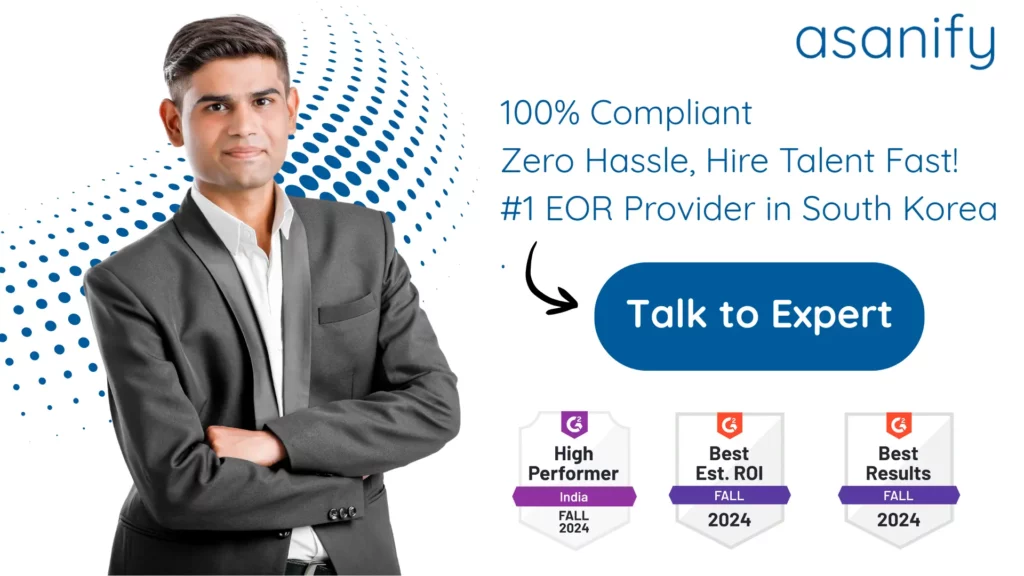South Korea has emerged as a leading nearshoring and outsourcing hub in Asia for global companies in 2025. With its advanced technological infrastructure, highly skilled workforce, and strong compliance with international standards, South Korea is particularly attractive for businesses in need of quality software development, engineering, legal process outsourcing, and multilingual customer support.
Strategically located and economically stable, South Korea is a trusted destination for U.S., European, and Asia-Pacific companies looking for a blend of innovation, talent, and cultural professionalism. Whether you’re outsourcing AI engineering, regulatory compliance tasks, or HR operations through an Employer of Record (EOR), this blog delivers a complete roadmap tailored to the South Korean outsourcing ecosystem.
Table of Contents
- What is Outsourcing and Why Do Companies Do It?
- Overview of the Outsourcing Industry in South Korea
- Why is South Korea a Hotspot for Outsourcing in 2025?
- What Types of Work Can You Outsource to South Korea?
- Three Commonly Outsourced Services in South Korea
- Step-by-Step Guide to Outsourcing to South Korea
- Best Practices for Outsourcing to South Korea
- Pros and Cons of Outsourcing to South Korea
- Legal and Compliance Framework in South Korea
- Cost Breakdown – How Much Can You Save?
- Outsourcing Projects from the USA to South Korea
- Conclusion
- FAQs
What is Outsourcing and Why Do Companies Do It?
Outsourcing is the strategic practice of delegating internal business functions to third-party vendors who possess specialized expertise. Organizations typically outsource to improve efficiency, save costs, and tap into external capabilities not available in-house. It spans various domains—from IT development and payroll processing to legal research and customer support.
Unlike offshoring, which implies geographic relocation of operations, outsourcing may occur locally or internationally. Companies may also choose nearshoring (outsourcing to a nearby country) or staff augmentation (adding external personnel temporarily to internal teams).
South Korea appeals to companies not just for cost reduction, but for strategic advantages like faster project delivery, innovation access, and 24/7 productivity. Service providers range from global outsourcing firms and BPO agencies to tech consultancies and legal KPOs, each serving different business needs.
Overview of the Outsourcing Industry in South Korea
In 2025, South Korea’s outsourcing industry is booming—especially in IT services, legal research, finance, and high-tech manufacturing. Known globally for its tech innovation, South Korea is home to robust R&D facilities and leading-edge digital infrastructure, making it a go-to hub for software engineering, AI development, and cybersecurity services.
Seoul, Busan, Daejeon, and Pangyo Techno Valley serve as major outsourcing hubs with abundant talent and connectivity. South Korea’s workforce is highly educated, with an emphasis on science, technology, engineering, and mathematics (STEM). Fluency in English, Japanese, and Mandarin among professionals also makes it a multilingual outsourcing destination.
Korean service providers comply with international certifications like ISO, SOC2, and GDPR-equivalent data security protocols under Korea’s Personal Information Protection Act (PIPA). In 2025, South Korea is recognized for delivering high-quality, scalable, and legally compliant services across key verticals.
Why is South Korea a Hotspot for Outsourcing in 2025?
Cost-Efficient for High-Value Services
While not as inexpensive as Southeast Asia, South Korea delivers significant cost advantages compared to hiring in the U.S., UK, or Western Europe. When factoring in quality, project speed, and reduced risk of compliance errors, Korea proves a financially efficient alternative.
Startups and mid-market companies benefit from flexible billing models offered by Korean freelancers and boutique firms. Services are often delivered under retainer, milestone-based, or fixed-price contracts—ideal for both short-term and long-term engagements.
Outsourcing in South Korea also reduces the overhead of managing full-time staff, including pensions, severance, and social security contributions.
World-Class Talent Pool
South Korea ranks among the top nations globally in education and digital literacy. Institutions like Seoul National University, KAIST, and POSTECH produce world-class engineers, AI researchers, and legal professionals.
Over 70% of the population aged 25–34 has tertiary education. Fields like computer science, biomedical engineering, fintech, and regulatory compliance see a consistent supply of fresh and seasoned talent. Additionally, Korea has a high proportion of bilingual and trilingual professionals proficient in English, Chinese, and Japanese—critical for global communication.
Whether you need machine learning experts, regulatory advisors, or finance professionals, South Korea provides a rich talent pool aligned with global standards.
High Communication Standards and Multilingual Capabilities
Korean professionals have strong command of English, especially in the tech and legal sectors. Many have studied or worked abroad, making them adept in global communication norms, Western business etiquette, and digital collaboration tools.
Customer support and business communication services in Korea are often delivered in multiple languages, including English, Japanese, Mandarin, and Korean. Call centers and BPO providers train staff extensively in cultural sensitivity, accent neutrality, and brand tone—making Korea a go-to destination for multilingual support in Asia-Pacific and beyond.
Time-Zone Advantage for Asia-Pacific and U.S. Collaboration
South Korea’s GMT+9 time zone is ideally suited for companies in Asia-Pacific and enables partial overlap with North America. U.S.-based clients benefit from overnight work cycles, allowing teams in Korea to deliver by the time U.S. offices start their day.
Real-time collaboration is also easy for Australian, Singaporean, and Japanese clients. Agile projects benefit from Korea’s punctual work culture and tech-savvy workforce. Korea’s time-zone positioning supports global handoffs and enables seamless daily collaboration with in-house teams across continents.

What Types of Work Can You Outsource to South Korea?
South Korea offers a powerful combination of technical and analytical expertise, making it ideal for high-value outsourcing. From software development and AI to legal research and compliance, Korean professionals deliver precision and innovation. The country’s strong education system and digital infrastructure support scalable, global-ready solutions. This makes South Korea a preferred destination for quality-driven outsourcing in 2025. The most commonly outsourced roles include:
- Software and mobile app development
- Artificial intelligence (AI) and machine learning solutions
- Legal support (e-discovery, IP research, cross-border contracts)
- Finance and accounting services
- Customer support (multilingual channels)
- Market research and competitive intelligence
- Graphic design, video production, and digital marketing
- HR operations and EOR services
- Regulatory compliance and audit support
These services are backed by modern infrastructure, strong IP protection, and internationally benchmarked delivery standards.
Suggested Read: Understanding Labour Laws in South Korea: Contracts, Work Hours, and Termination Rules
Three Commonly Outsourced Services in South Korea
1. Software Development and Engineering
South Korea is a leader in software and AI outsourcing. From mobile apps to enterprise platforms, Korean developers are known for delivering secure, scalable, and UX-optimized digital products.
Most firms follow agile methodologies, integrate DevOps practices, and use CI/CD pipelines. Whether you need a fintech solution, blockchain application, or custom ERP system, Korean software engineers deliver world-class quality backed by ISO and cybersecurity certifications.
2. Legal Process Outsourcing (LPO)
Korea’s proximity to APAC and deep understanding of global trade law make it ideal for outsourcing legal functions. LPO providers handle tasks such as contract abstraction, compliance audits, IP law, and GDPR-PIPA advisory.
Multinational companies rely on Korean legal experts for bilingual documentation, legal translations, and litigation support. This service is particularly useful for U.S. and European companies entering Asian markets.
3. Multilingual Customer Support
Korea has developed a strong reputation for delivering multilingual BPO services across sectors like e-commerce, gaming, healthcare, and SaaS. Support is available via phone, email, social, and chat in Korean, English, Chinese, and Japanese.
Service providers in Seoul and Busan often use AI-driven CRM and ticketing systems, ensuring timely resolution and superior customer experience.
Step-by-Step Guide to Outsourcing to South Korea
Analyze Market Fit
Research Korea’s strengths in IT, LPO, and multilingual support. Understand PIPA, labor laws, and cross-border tax treaties.
Define Scope and Needs
Identify non-core activities suitable for outsourcing. Map KPIs, budget, and delivery timelines.
Shortlist Providers
Look at firms like Samsung SDS, Douzone, Fasoo, and local tech consultancies. Evaluate language support, certifications, and past clients.
Send RFPs
Structure your RFP with clear deliverables, compliance clauses, timelines, and budget ranges.
Due Diligence
Check data privacy certifications, team size, scalability, legal documentation, and prior case studies.
Virtual or Onsite Visit
Attend demos, assess cultural fit, and validate infrastructure and team dynamics.
Legal Contracts and SLAs
Sign NDAs, SLAs, and IP assignment agreements. Ensure inclusion of data protection, liability, and dispute resolution terms.
Team Onboarding
Share SOPs, brand guidelines, and access credentials. Designate liaison managers for cross-border collaboration.
Use Digital Tools
Set up Asana, Jira, Slack, Google Meet, and time-tracking tools like Time Doctor or Hubstaff.

Best Practices for Outsourcing to South Korea
- Set Clear Objectives: Use SMART goals and measurable KPIs.
- Ensure Regulatory Compliance: Always include clauses for GDPR, PIPA, and IP security.
- Maintain Regular Communication: Weekly check-ins, monthly reviews, and semi-annual strategic audits.
- Invest in Training: Provide continuous knowledge-sharing sessions.
- Create a Feedback Loop: Use client satisfaction surveys and performance dashboards.
- Start with Pilot Projects: Test compatibility before scaling.
Pros and Cons of Outsourcing to South Korea
| Pros | Cons |
| Advanced technical capabilities | Higher cost than Southeast Asia |
| Multilingual and educated workforce | Complex local tax and legal structure |
| Strong IP and data protection laws | Cultural nuances may need adaptation |
| Strategic APAC location with time-zone benefits | Limited freelance community compared to India or Eastern Europe |
Legal and Compliance Framework in South Korea
South Korea enforces robust outsourcing laws aligned with global standards. The Personal Information Protection Act (PIPA) governs data privacy and is Korea’s equivalent of the GDPR. Legal agreements must address data transfer, breach liabilities, and intellectual property ownership.
When outsourcing, ensure your vendor has a Data Protection Officer (DPO), complies with cross-border tax treaties, and is registered for VAT where applicable. Contracts should cover dispute resolution under Korean law or international arbitration standards.
For employment-based functions, many businesses use Employer of Record (EOR) providers to manage compliance, benefits, and taxes for outsourced personnel.
Cost Breakdown – How Much Can You Save?
| Role | South Korea Monthly Cost (₩/€) | U.S./UK Monthly Cost (€) |
| Software Developer | €3,500–€5,000 | €8,000–€12,000 |
| Legal Analyst | €3,200–€4,800 | €7,000–€10,000 |
| Support Agent | €1,800–€2,800 | €4,500–€6,000 |
In addition to labor cost savings, companies benefit from reduced hiring overheads, flexible contracts, and optimized project timelines.

Outsourcing Projects from the USA to South Korea
U.S. companies are rapidly choosing South Korea for outsourcing due to its strength in technology, legal compliance, and back-office operations. With its skilled workforce and time-zone advantage, Korea enables faster turnaround and high-quality output. Businesses benefit from overnight productivity and reliable service delivery. This makes it a strategic partner for scalable global growth. Popular use cases include:
- U.S. fintechs outsourcing backend development to Korean engineers
- Global legal teams outsourcing GDPR-PIPA documentation
- American e-commerce firms hiring Korean support agents for APAC expansion
Korea’s combination of overnight productivity and high compliance makes it a valuable partner for U.S. firms targeting Asia or global growth.
Suggested Read: Remote Employees Onboarding Checklist with EOR in South Korea
Conclusion
Outsourcing to South Korea in 2025 is more than a cost-saving tactic—it’s a strategic investment in innovation, compliance, and multilingual talent. From software development to legal support and customer service, Korea delivers scalable and high-quality solutions that meet the needs of global enterprises.
To simplify your outsourcing journey, partner with platforms like Asanify, which connect you to pre-vetted Korean vendors and EOR providers—ensuring legal compliance, seamless onboarding, payroll processing, and long-term success.
FAQs
Yes, Korea offers strong data protection, world-class talent, and advanced digital infrastructure.
Software engineering, legal research, compliance, and multilingual customer support.
Yes, especially among tech, legal, and BPO professionals in Seoul and Busan.
Korea excels in high-value, compliance-intensive services and advanced tech projects.
Yes, many boutique firms and freelancers offer project-based pricing models.
South Korea adheres to PIPA (data protection) and offers strong IP protection.
Yes. South Korea welcomes both remote and hybrid collaboration models.
Yes. Korea supports tech outsourcing and foreign partnerships through R&D grants and tax benefits.
Not to be considered as tax, legal, financial or HR advice. Regulations change over time so please consult a lawyer, accountant or Labour Law expert for specific guidance.

